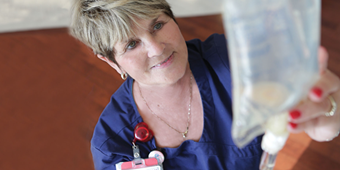When Symptoms Persist in Life After Cancer

Answer a few questions and we'll provide you with a list of primary care providers that best fit your needs.
You’ve just been given the all-clear: your cancer is either gone, or is in remission. It is a wonderful, joyous time of celebration. But it may be too early to put cancer completely behind you. Your cancer, and the treatment that helped you beat it, could be packing some future side effects.
Many people who have had cancer treatment experience “late effects” – side effects that can occur months or years after cancer treatment ends.
To help you help yourself in your post-cancer life, ask your doctor to document your cancer treatment history, also known as a survivorship care plan. This plan contains the possible physical and emotional side effects you may experience due to the specific type of cancer and treatments you had, as well as general information, such as your treatment dates.
Your plan will be a very personal assessment. Still, it likely will include some of these very common post-cancer symptoms: fatigue, nerve pain and oral health problems.
Post-Cancer Fatigue
Having and battling cancer wears you down. Many people experience post-cancer fatigue. The causes vary – including a weakened immune system, hormonal changes, electrolyte problems and other imbalances in your body. Feeling so tired may make it difficult for you to do the normal daily activities you looked forward to during treatment.
Ask your doctor about medications you can take to help treat depression, control pain, sleep better or feel more awake during the day.
Your cancer, and the treatment that helped you beat it, could be packing some future side effects.
Problems In Your Mouth after Cancer Treatment

Chemotherapy and radiation in your treatment regimen can cause mouth problems: including sores, pain, infection, changes in saliva production and dry mouth. Be sure to let your dentist know if you’ve had chemotherapy, radiation, or a bone marrow transplant. Each of these treatment methods can cause specific oral health issues.
Ask your dentist how you can best keep your mouth and teeth healthy. One recommendation may be exercise such as gently opening and closing your mouth 20 times, three times per day to prevent stiff jaw muscles. Ask if it is safe for you to floss, use mouthwash with alcohol in it and if you should use a daily fluoride gel.
Cancer-caused Nerve Pain (Peripheral neuropathy)
Some cancer treatments can damage the nerves around your brain and your spinal cord. You may feel pain, tingling, numbness, or even sharp, stabbing pain.
Ask your doctor about ways to relieve the pain. Options may include topical medicine in the form of a patch or a cream, antidepressant medicine, or opioids such as codeine or morphine if the pain is severe.
Make a Cancer Survivorship Care Plan
As you transition your care from your cancer specialists to your primary care provider, a cancer survivorship plan can help your doctor best help you. This plan may include specific details of the type of cancer you had, any possible side effects that you might face, and contact information for your cancer care team.
Consider asking that your plan include advice on how to stay healthy to help prevent the return of cancer. Together you and your doctors can create the plan that will see you through healthier years ahead.
Answer a few questions and we'll provide you with a list of primary care providers that best fit your needs.
Source: American Society of Cancer Research (ASCO); MD Anderson Cancer Center




